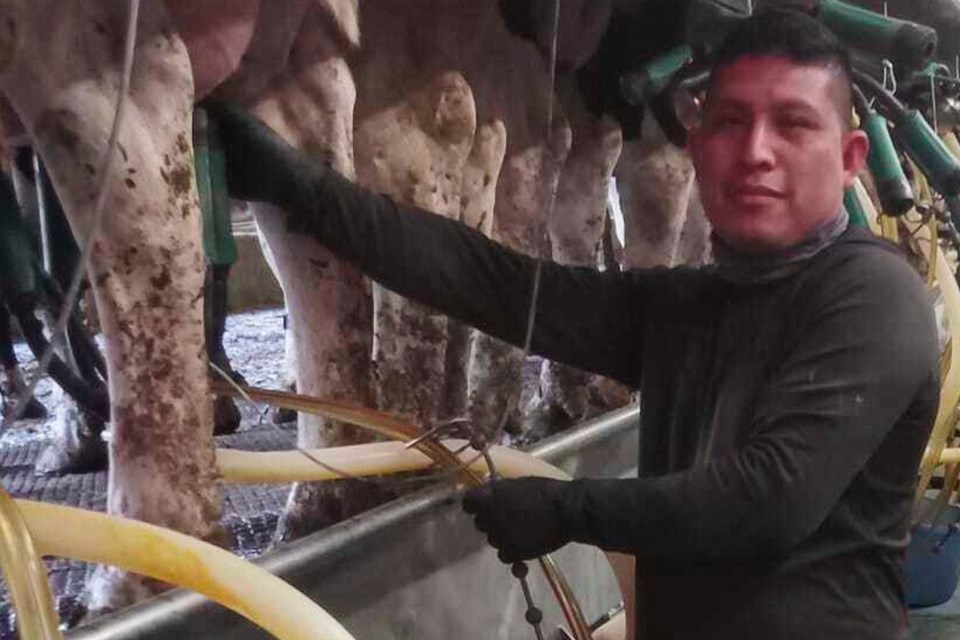MONTPELIER, Vt. (AP) ã After six 12-hour shifts milking cows, Josûˋ Molina-Aguilar's lone day off was hardly relaxing.
On April 21, he and seven co-workers were arrested on a Vermont dairy farm in what advocates say was one of the stateãs largest-ever immigration raids.
ãI saw through the window of the house that immigration were already there, inside the farm, and thatãs when they detained us,ã he said in a recent interview. ãI was in the process of asylum, and even with that, they didnãt respect the document that I was still holding in my hands.ã
Four of the workers were swiftly deported to Mexico. Molina-Aguilar, released after a month in a Texas detention center with his asylum case still pending, is now working at a different farm and speaking out.
ãWe must fight as a community so that we can all have, and keep fighting for, the rights that we have in this country,ã he said.
Ryan Brissette, spokesman for the U.S. Customs and Border Protection, said agents initially responded to a report from a concerned citizen who saw two people carrying backpacks entering private farm property near the Canadian border. Agents apprehended one person at the scene and more during the ensuing search of the area, he said.
The owner of the farm declined to comment. But Brett Stokes, a lawyer representing the detained workers, said the raid sent shock waves through the entire Northeast agriculture industry.
ãThese strong-arm tactics that weãre seeing and these increases in enforcement, whether legal or not, all play a role in stoking fear in the community,ã said Stokes, director of the Center for Justice Reform Clinic at Vermont Law and Graduate School.
That fear remains given the mixed messages coming from the White House. President Donald Trump, who campaigned on a promise to deport millions of immigrants working in the U.S. illegally, last month at farms, restaurants and hotels. But less than a week later, Assistant Homeland Security Secretary Tricia McLaughlin said worksite enforcement would continue.
Asked for updated comment Monday, the department repeated McLaughlin's earlier statement.
ãWorksite enforcement remains a cornerstone of our efforts to safeguard public safety, national security and economic stability,ã she said.
Such uncertainty is causing problems in big states like , where farms produce more than three-quarters of the countryãs fruit and more than a third of its vegetables. But itãs also affecting small states like Vermont, where dairy is as much a part of the stateãs identity as its famous maple syrup.
Nearly two-thirds of all milk production in New England comes from Vermont, where more than half the stateãs farmland is dedicated to dairy and dairy crops. There are roughly 113,000 cows and 7,500 goats spread across 480 farms, according to the Vermont Agency of Agriculture, Food and Markets, which pegs the industryãs annual economic impact at $5.4 billion.
That impact has more than doubled in the last decade, with widespread help from immigrant labor. More than 90% of the farms surveyed for the agencyãs recent report employed migrant workers.
Among them is Wuendy Bernardo, who has lived on a Vermont dairy farm for more than a decade and has an active application to stop her deportation on humanitarian grounds: Bernardo is the primary caregiver for her five children and her two orphaned younger sisters, according to a signed by dozens of state lawmakers.
Hundreds of Bernardo's supporters showed up for her most recent check-in with immigration officials.
ãItãs really difficult because every time I come here, I donãt know if Iãll be going back to my family or not,ã she said after being told to return in a month.
Like Molina-Aguilar, Rossy Alfaro also worked 12-hour days with one day off per week on a Vermont farm. Now an advocate with Migrant Justice, she said the dairy industry would collapse without immigrant workers.
ãIt would all go down,ã she said. ãThere are many people working long hours, without complaining, without being able to say, ãI donãt want to work.ã They just do the job.ã
___
Ramer reported from Concord, N.H.
Holly Ramer And Amanda Swinhart, The Associated Press



